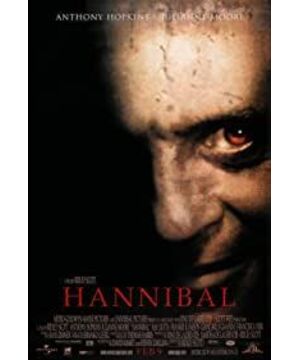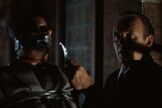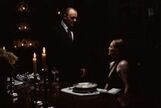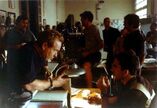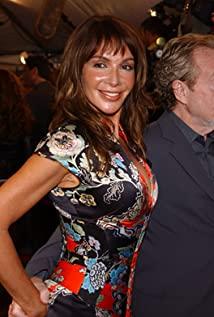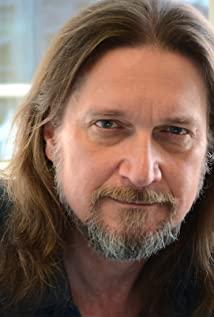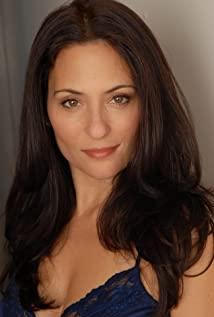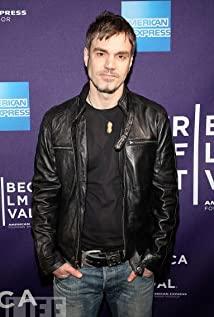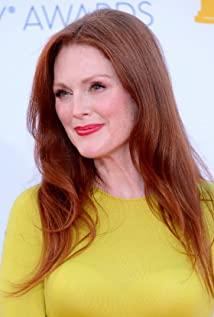Dr. Lecter was not a born villain, but he chose such a life in the end, where he lived a life of his own, where he could taste fine wine and study ancient hand scrolls, while at the same time slaughtering leisurely and playing with the world with a smile. Those who seek nobility will fall for it, because he can recite Dante's masterpiece in the Italian Tuscan dialect, and the guardian of justice lest someone's blood be on the lips of this recitation. He is a man who surpasses everyone. In a world that is muted by noise, he uses extreme means to maintain nobility; he takes revenge on the times with personal behavior, and such futile efforts have made a generation of legends.
The film itself is the pulse of the times. If there is no such diverse and mixed world, it is difficult to give birth to a heterogeneity like Hannibal Lecter; precisely because he is a product of this era, he himself questioned the era. The laws of crime and punishment are blurred by personal ideas, and the boundaries between good and evil are suddenly overwhelmed.
Cinema is an urge to express, which is a fundamental tenet of all masterpieces. Without sincere impulses, there would be no touching films. It is precisely because the film carries the passion and thinking of the creator that the film is not just an entertainment, but a possible expression of a personal philosophy.
Hannibal is a melancholy who reminisces about the age of the elite. However, he lives in a modern society where rituals are broken and vulgarity is rampant. He can't accept that people who are not as intelligent and talented as him are making noise in this world. "Rudeness is contagious," so rude people must be purged mercilessly. Such an arbitrary belief threw all upon the chopping board on which he had slashed, and all beings became the object of judgment. What he wants to be is God, a superman, a tyrant who executes justice, but unfortunately this justice is his personal justice.
"The world is flat", the flat earth provides communication and convenience, but also wipes out the dignity of the explorer and the prestige of God. On a flat land, people are content with the life of reptiles and no longer look up at the stars, and those who look up at the stars die in a hurry in loneliness. Hannibal is a man who looks up at the stars, but he has to rebel against his destiny. His ego and trauma gave him the impetus to resist, and his intelligence and talent gave him the possibility to resist. Combining his wounded soul with conceited hallucinations, he sees himself as the savior of the age, as the judge of mankind, attributing all his losses to the vulgarity of the world, and beautifying his revenge impulses as noble Purifying behavior. So resistance becomes art.
Such a cold-blooded and beautiful soul is a freak created by the overlapping of times. His life experience can become a legend, but the legend is thought-provoking, because it is the tragedy of an era that cannot be changed. The era made him, and he was bent on turning it around, back to the era of elite tyranny that made him feel psychologically balanced. A person who moves against the times is bound to be overwhelmed by the times, but he wants to create his own times by himself-maybe in the end he himself knows it can't be done, so everything becomes a desperate revenge.
No matter how he imagines himself as a hero who saves the world, his actions are always selfish, all he does is to maintain his self-esteem bruised by the times and restore the sense of omnipotence that everyone must lose after childhood.
In the "Silence of the Lambs" trilogy, the images in this part are particularly exquisite, which can be described as the aesthetic language of film art. Through the wonderful interpretation of light and shadow, soundtrack, lines and actors, a fascinating fragrance is delivered to the audience. , This fragrance is mixed with the sense of the years of the dead leaves in the ancient scrolls, the noble sense of the lacquer on the envelope, and the stench of blood and the body odor of beasts. people's hearts.
In terms of soundtrack, the renowned Hans Zimmer once again demonstrated his profound soundtrack skills, not only in the continuation of the first "Silence of the Lambs" (the theme of Bach's quiet and elegant "Goldberg Variations" appeared in the brewing murder), but also There's amazing innovation (the excitement of sexual abuse is portrayed in "Blue Danube," and it reappears when Mason is ready to tit-for-tat, mirrored before and after). The music is always full of a quiet and noble temperament, which accurately expresses the charm of the film. It is especially worth mentioning that, in the end, the long line of police cars flew to the scene of the murder in the dark night. In order to set off the tense atmosphere in ordinary movies, the picture will be filled with sirens and fast music, but here is silent, only tranquility. The piano gurgling flowing, continued the elegant atmosphere of the whole film in the tense plot. Coupled with the mini-opera "Vide Cor Meum" specially created for the film by Irish musician Patrick Cassidy, the beautiful arias are tangled in the air like gentle vines, which is intoxicating. And when the film ended and the song played again, it made people feel an indescribable sense of nostalgia and couldn't bear to leave the beautiful atmosphere of the film.
What must also be mentioned is the director's metaphor. I don’t know how many people have noticed that almost every murder scene has an A word. Whether it’s a random ladder or a steel frame that looks like a background, it always contains an A shape, intentionally or unintentionally. This is an interesting thing for me. 's discovery. The letter A is reminiscent of the famous novel "The Scarlet Letter", where the adulterous woman has an A letter engraved on her forehead, because the letter A symbolizes punishment. Also, if you are careful enough, you will find that in those tense and suffocating scenes, there is always a rotating electric fan on the ceiling behind the characters. It looked very scary. In "Silence of the Lambs", I also discovered this detail, which is a tacit coincidence of the directors.
The Hannibal portrayed by Anthony Hopkins is an unsurpassed classic. The blurred and sexy eyes, the narration full of charm and tension (especially the deliberately long tail), cannot be imitated. The head of Hannibal, composed of a flock of pigeons in the opening square, with his signature mysterious smile, is still fresh in our memory.
View more about Hannibal reviews


